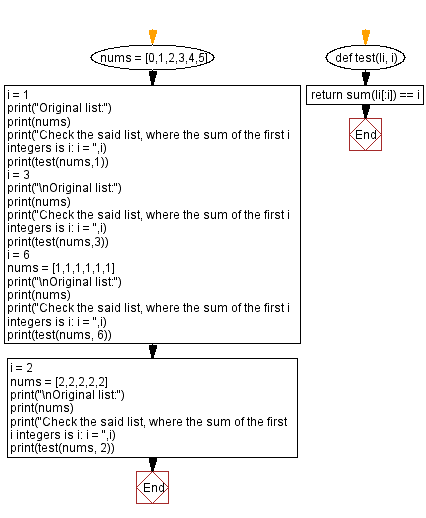Python: List of integers where the sum of the first i integers is i
Sum of First i Equals i
Write a Python program to check a given list of integers where the sum of the first i integers is i.
Input: [0, 1, 2, 3, 4, 5] Output: False Input: [1, 1, 1, 1, 1, 1] Output: True Input: [2, 2, 2, 2, 2] Output: False
Sample Solution:
Python Code:
# Define a function named 'test' that takes a list 'li' and an integer 'i' as input
def test(li, i):
# Check if the sum of the first 'i' integers in 'li' equals 'i'
return sum(li[:i]) == i
# Create a list 'nums' with specific elements
nums = [0, 1, 2, 3, 4, 5]
# Assign an integer 'i' to the variable
i = 1
# Print the original list
print("Original list:")
print(nums)
# Print a message indicating the current value of 'i'
print("Check the said list, where the sum of the first i integers is i: i =", i)
# Print the result of the test function applied to the 'nums' list with the current value of 'i'
print(test(nums, 1))
# Update the value of 'i'
i = 3
# Print a message indicating the updated value of 'i'
print("\nOriginal list:")
print(nums)
# Print the result of the test function applied to the 'nums' list with the updated value of 'i'
print("Check the said list, where the sum of the first i integers is i: i =", i)
print(test(nums, 3))
# Update the value of 'i' and 'nums'
i = 6
nums = [1, 1, 1, 1, 1, 1]
# Print a message indicating the updated value of 'i'
print("\nOriginal list:")
print(nums)
# Print the result of the test function applied to the updated 'nums' list with the updated value of 'i'
print("Check the said list, where the sum of the first i integers is i: i =", i)
print(test(nums, 6))
# Update the value of 'i' and 'nums'
i = 2
nums = [2, 2, 2, 2, 2]
# Print a message indicating the updated value of 'i'
print("\nOriginal list:")
print(nums)
# Print the result of the test function applied to the updated 'nums' list with the updated value of 'i'
print("Check the said list, where the sum of the first i integers is i: i =", i)
print(test(nums, 2))
Sample Output:
Original list: [0, 1, 2, 3, 4, 5] Check the said list, where the sum of the first i integers is i: i = 1 False Original list: [0, 1, 2, 3, 4, 5] Check the said list, where the sum of the first i integers is i: i = 3 True Original list: [1, 1, 1, 1, 1, 1] Check the said list, where the sum of the first i integers is i: i = 6 True Original list: [2, 2, 2, 2, 2] Check the said list, where the sum of the first i integers is i: i = 2 False
Flowchart:

For more Practice: Solve these Related Problems:
- Write a Python program to check if the cumulative sum of the first i elements of a list equals i for each i, using iterative summation.
- Write a Python program that uses list slicing to verify that the sum of the first i numbers equals i for every valid i in the list.
- Write a Python program to determine if a list of integers satisfies the condition by computing the cumulative sum and comparing to an arithmetic series.
- Write a Python program to implement the check recursively by verifying the condition for the first element and then for the remainder of the list.
Go to:
Previous: Find a list of one hundred integers between 0 and 999 which all differ by ten from one another.
Next: Split a string of words separated by commas and spaces into 2 lists: words and separators.
Python Code Editor :
Have another way to solve this solution? Contribute your code (and comments) through Disqus.
What is the difficulty level of this exercise?
Test your Programming skills with w3resource's quiz.
